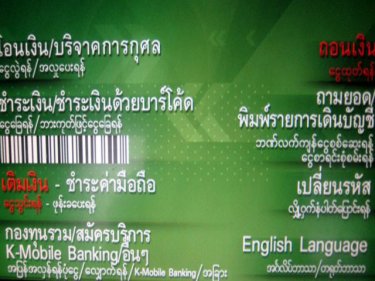KASIKORN Bank, one of the largest banks in Thailand, has dropped English as the first alternative at its ATM machines and substituted the Burmese language.
The switch by the bank is a clear indication of the major social change that is now taking place on Phuket and throughout Thailand as more Burmese become legitimate workers with ''validated'' ID.
''The bank recognises that Burmese are now able to bank under their own names in their own accounts,'' said Kasikorn's Phuket branch general manager, Banturng Rawiwan. ''Before, they would only be able to bank by using the account of a Thai friend.''
Once, the Kasikorn Bank had English as the second-choice language, but from September 1, Burmese replaced English. Customers at Kasikorn ATMs can still call up an English version if required, but it's a third choice behind the Thai and Burmese languages.
Numbers of illegal and legal Burmese on Phuket are reported to have soared to about 200,000 within the past year or so. This compares with an official registered population of 320,000 Thai residents on Phuket and a true total population of Thais that might exceed 600,000.
Estimates of the number of Burmese now living and working in Thailand range well above one million.
Burmese have migrated to Thailand's Andaman holiday provinces in vast numbers since the 2004 tsunami, driven by poverty and oppression at home and attracted by the relative prosperity of menial laboring jobs in Phuket's property industry.
Despite large-scale corruption that frequently includes officials and officers of the law who benefit from human trafficking and sexual enslavement, the tide of economic refugees along Thailand's holiday coast continues to build.
Construction-gang Burmese still live in corrugated shanty shacks that dot the whole of Phuket, but they are no longer blamed for most crimes and subject to a harsh 8pm curfew. They can even buy motorcycles.
An increasing number of Burmese speak good English and aim to move up from jobs as laborers, maids and plantation workers to find work in restaurants and resorts.
The border town of Ranong, three hours' drive north of Phuket, may provide an insight into the island's future. Signage in local Ranong supermarkets is already in Thai, Burmese and English, and Burmese even covertly run their own schools.
Burmese Accuse Thai Officials of People TraffickingThe switch by the bank is a clear indication of the major social change that is now taking place on Phuket and throughout Thailand as more Burmese become legitimate workers with ''validated'' ID.
''The bank recognises that Burmese are now able to bank under their own names in their own accounts,'' said Kasikorn's Phuket branch general manager, Banturng Rawiwan. ''Before, they would only be able to bank by using the account of a Thai friend.''
Once, the Kasikorn Bank had English as the second-choice language, but from September 1, Burmese replaced English. Customers at Kasikorn ATMs can still call up an English version if required, but it's a third choice behind the Thai and Burmese languages.
Numbers of illegal and legal Burmese on Phuket are reported to have soared to about 200,000 within the past year or so. This compares with an official registered population of 320,000 Thai residents on Phuket and a true total population of Thais that might exceed 600,000.
Estimates of the number of Burmese now living and working in Thailand range well above one million.
Burmese have migrated to Thailand's Andaman holiday provinces in vast numbers since the 2004 tsunami, driven by poverty and oppression at home and attracted by the relative prosperity of menial laboring jobs in Phuket's property industry.
Despite large-scale corruption that frequently includes officials and officers of the law who benefit from human trafficking and sexual enslavement, the tide of economic refugees along Thailand's holiday coast continues to build.
Construction-gang Burmese still live in corrugated shanty shacks that dot the whole of Phuket, but they are no longer blamed for most crimes and subject to a harsh 8pm curfew. They can even buy motorcycles.
An increasing number of Burmese speak good English and aim to move up from jobs as laborers, maids and plantation workers to find work in restaurants and resorts.
The border town of Ranong, three hours' drive north of Phuket, may provide an insight into the island's future. Signage in local Ranong supermarkets is already in Thai, Burmese and English, and Burmese even covertly run their own schools.
Latest Burmese caught working illegally in Phuket and along the Andaman coast are taken back to the border town of Ranong, where two Burmese say officials are involved in people trafficking.
Burmese Accuse Thai Officials of People Trafficking
'World Citizen' Office Aims to Make Burmese Legal
Labor Innovation A new recruitment office in Phuket aims to help legalise the status of the thousands of illegal Burmese working on the island, Phuket's governor has been told.
'World Citizen' Office Aims to Make Burmese Legal
Phuket Bypass: Navy Denies 'Chasing' Boatpeople
Latest Tourist sightseers and refugees needing food and water have become the unusual mix off Phuket and the Andaman coast again as the Navy politely sends boatpeople on their way.
Phuket Bypass: Navy Denies 'Chasing' Boatpeople
Phuket Corruption Needs Fixing, Says Thai FM
Breaking News Foreign Minister Kasit Piromya listened to complaints from honorary consuls and even used the ''m'' word in talking about corruption, tuk tuks, local authorities and the height limit.
Phuket Corruption Needs Fixing, Says Thai FM
Phuket Team Scoops Top Award for Reporting
Latest Phuketwan has picked up a top news award as part of the team that broke the Scoop of the Year 2009. Coincidentally, the award comes amid reports of boatpeople near Phuket.
Phuket Team Scoops Top Award for Reporting




